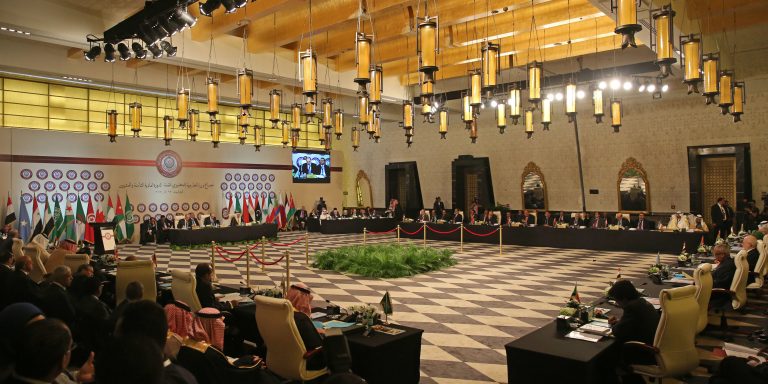INTELBRIEF
August 1, 2018
IntelBrief: A revived ‘Arab NATO’?

- There are recent reports that the Trump administration is interested in reviving the idea of an ‘Arab NATO’.
- In theory, such a force would reduce direct U.S. military commitments in the region while serving as an anti-Iran bulwark.
- In reality, the potential member states—particularly the UAE—are stronger militarily than ever but have serious regional and internal issues.
- More resources need to be focused on positive broad-based change in the region rather than on increasing already substantial military spending.
.
As the U.S. increases its pressure on and rhetoric against Iran, there are press reports that the Trump administration is considering the idea of a Middle Eastern collective defense coalition. This so-called ‘Arab NATO’ is meant to serve as a credible deterrent against Iranian influence and military aggressions. The Trump administration is not the first U.S. administration to float the idea of a regional defense alliance consisting of the most powerful Gulf Arab countries, including Saudi Arabia and the United Arab Emirates (UAE). However, previous attempts to put the idea into practice have failed.
Militarily, the UAE and Saudi Arabia are more developed now than ever, with the UAE in particular having made advances in overall military strike capability. However, crucial foundations of logistics, maintenance, and accurate targeting are still systemic problems with all the possible members of what the Trump administration is calling the Middle East Strategic Alliance (MESA). The war in Yemen—in which both Saudi Arabia and the UAE have been fighting for several years, with only a mounting humanitarian disaster to show for the effort—highlights the countries’ shortcomings with respect to military logistics and which have required constant U.S. support. From a strictly military standpoint, the Gulf countries are dramatically improving their capabilities. They are not, however, at a level that would result in a dramatic decrease in U.S. military support.
Containing and deterring Iran is the goal of this latest push for MESA. With respect to Iran, the U.S., Saudi Arabia, and the UAE are in lock step agreement; all see Iran as the main driver of regional instability and a serious regional military threat. The Trump administration is focused on increasing pressure against the Iranian regime—both unilaterally and by pressuring U.S. allies to do the same. The other signatories to the Joint Comprehensive Plan of Action (JCPOA), which the U.S. walked away from on May 8, 2018, are still committed to adhering to the agreement. These remaining signatories are China, France, Iran, Russia, the U.K. Germany, and the E.U. The U.S. stance on Iran is at odds with Europe and Asia, but fully in line with Saudi Arabia and the UAE.
A stumbling block to this latest push for MESA is the same as for previous efforts. The Gulf countries are not a stable, unified bloc, but rather a group of uneasy neighbors with a history of intrigue and machinations against each other. Saudi Arabia and the UAE have continued their pointless and counterproductive campaign against fellow Gulf Cooperation Council (GCC) member Qatar, a move that has hindered the goal of increasing regional unity against Iran. Also, the focus, effort, and costs of creating and sustaining a MESA coalition prioritizes a strictly military approach to dealing with regional instability, as opposed to an approach that supports diplomatic, social, political and economic solutions. A strictly military approach to the ‘Iran problem’ is both unsustainable and short-sighted. By prioritizing military capabilities over badly needed social reforms and addressing serious issues like water shortages and petro-dependent economies, the Gulf countries inevitably engage in more conflict than cooperation. There are very real security concerns in the region to be sure, including those related to Iran. Yet a more effective bulwark and deterrence against Iranian influence are healthier and more resilient communities and societies throughout the Middle East region.
.
For tailored research and analysis, please contact: info@thesoufancenter.org
[video width="960" height="540" mp4="https://thesoufancenter.org/wp-content/uploads/2018/08/IB-0801.mp4" poster="https://thesoufancenter.org/wp-content/uploads/2018/08/AP_17086417037284.jpg"][/video]